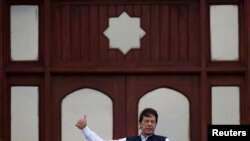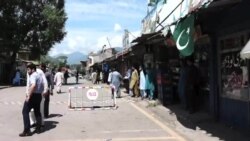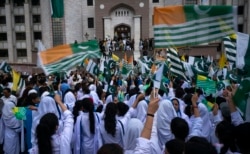The Pakistani prime minister's call for the country to show solidarity with Kashmiris by standing outside their homes, shops and offices for 30 minutes Friday seemed to receive a lackluster response. Many questioned its efficacy.
"Whatever they're doing is without any planning. This kind of agitation is not effective. The public doesn't think this will help Kashmir," said trader Malik Tahir Mahmood, standing outside his shop in capital Islamabad.
Another shopkeeper, Shahwez Khattak, said he will follow what others in the market do regarding the protest, but added that he did not understand the actions.
Prime Minister Imran Khan had announced the measure to protest India's recent decision to revoke the special status of Indian-controlled Kashmir — depriving the region of hitherto-granted autonomy. To avoid retaliation from the local population, the Indian government deployed thousands of additional security personnel, announced a curfew, suspended all phone service, and shut down television channels, effectively cutting off the region from the rest of the world.
Pakistan, which claims ownership of the disputed territory, responded by ousting the Indian high commissioner and partially cutting trade and transport links with India.
Government push
Khan said Friday's protests would help generate international media coverage and bring Kashmir's issue into focus.
Significant government resources were used to try to make the event a success. Employees in many government departments were told to show up to the prime minister's secretariat to listen to his speech, and students from government schools were led to road sides and given small flags to wave.
Local TV channels, public and private, were ordered to run Kashmir-related programs as well as display a logo on their screens reading "Kashmir will become Pakistan."
No flights were to take off during the 30 minutes starting at noon local time, and all trains were to stop for a minute at noon. All traffic lights were to turn red for half an hour. At exactly 12 p.m., national anthems of both Pakistan and Kashmir were to be played on most TV and radio channels.
Forced participation
However, the participation from the public seemed mostly forced, rather than voluntary.
In capital Islamabad, where shops normally start closing around noon for Friday prayers, many decided to close early. Traffic flow was normal and other than a few cars here and there, no one stopped at noon until traffic police blocked all intersections and forced people to wait for 30 minutes.
At one such intersection, a VOA team recorded people arguing with the traffic police.
Still, some people agreed with the PM's step.
"The whole world will watch us and realize Kashmir's issue is real," said real estate broker Chaudhry Azhar.
Another man, Abu Bakr Chawla, said any actions that avoided conflict were good.
"We don't want war. We want things to be resolved peacefully," he said.
The nationwide demonstrations are supposed to take place weekly till Sept. 27, when the PM will address the United Nations General Assembly.







